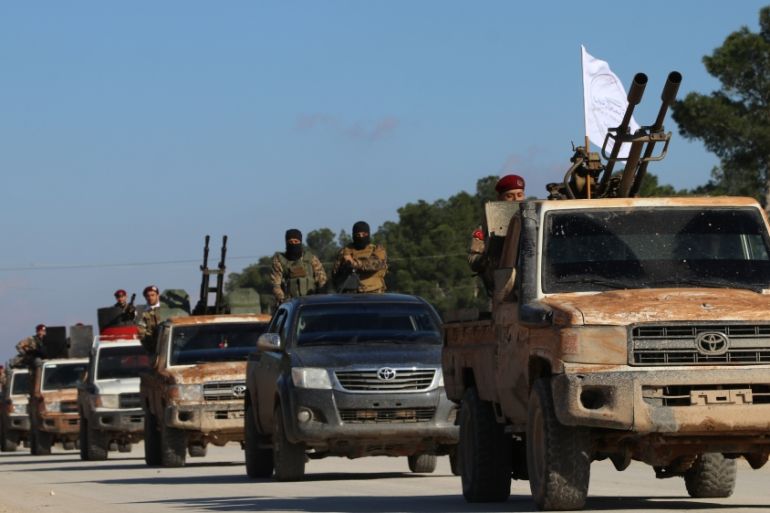Syria safe zone: ‘A long-term problem rather than a solution’
While talks on safe zones for Syrian refugees continue, there is no clear plan on who will govern them and how.

Ankara, Turkey – President Recep Tayyip Erdogan said 300,000 Syrian refugees have returned to their war-torn country as he revived talk of creating “safe zones” for millions more.
While Turkish officials have not provided details on where the zones would be located or how they would be administered, analysts said it was likely the refugees would be placed in areas of northern Syria under nominal Turkish control.
Keep reading
list of 4 itemsUN report charts lethal cost of migration over past decade
Conflict, climate, corruption drive Southeast Asia people trafficking: UN
Bodies of three Rohingya found as Indonesia ends rescue for capsized boat
Turkey currently hosts more than 3.6 million registered Syrian refugees, according to the UN refugee agency (UNHCR).
Tensions between locals and Syrians have built over the course of the nearly eight-year war, compounded by competition for jobs and resources as Turkey faces recession.
Since it launched the Euphrates Shield military operation in north Syria in August 2016, Ankara has encouraged refugees to remain in camps close to the border – welcoming only the most vulnerable into Turkey.
The operation – and the Olive Branch campaign of last year that saw Turkey seize the Kurdish enclave of Afrin – has left a swath of Syrian territory under the control of Turkey’s rebel allies.
“After Afrin and other places came under the control of Turkish-supported groups, some Syrians returned to these areas but it’s a controversial issue,” said Nihat Ali Ozcan, an analyst at the Economic Policy Research Foundation of Turkey.
“Erdogan insisted that Syrian civilians will return but although this seems a good idea, it could create a huge problem.
“The people who lived there originally are very mixed – Kurds, Arabs and so on. I think it will create a huge security concern and could see confrontation between these groups.”
Long-term issues
Kamal Alam, a visiting fellow at the Royal United Services Institute in London, said settling people under Turkish authority was a “temporary move before the Syrian government sets things right”.
“That is a long-term problem rather than short-term solution,” said Alam.
In the wake of military incursions, Turkish development agencies have moved into Syria to rebuild the water, transport, and energy infrastructure as well as public services such as schools and hospitals.
Across northern Aleppo province, Turkish investment has provided jobs for locals while municipal councils are run with Turkish support.
|
|
Children study the Turkish language in school and goods from across the border fill shop shelves. Turkish-trained police officers patrol the streets of cities such as Azaz, al-Bab and Jarabulus.
According to the Turkish Cooperation and Coordination Agency, Turkey has spent $33bn on Syrian refugees since the start of the war and anticipates spending a further $8.2bn this year.
“Turkey has put in considerable financial and human resource investment in northern Syria, which looks like a state within a state,” said Alam.
“Syria has rightly called this a violation of the UN charter of intervention, both as an occupying military force and creating a parallel state structure.”
Despite the level of rebuilding, it remains to be seen whether north Aleppo could accommodate the millions of Syrians inside Turkey, or how they would be administered.
“Who knows,” said Mitat Celikpala, an international relations professor at Istanbul’s Kadir Has University, when asked about how the zones would be governed. “This is an issue to negotiate with the other powers.”
Refoulement
The feasibility of returning Syrians to a war zone is also in doubt.
Turkey has granted citizenship to more than 55,000 Syrians since the start of the war and the government has been sending mixed messages to refugees.
Last month, Interior Minister Suleyman Soylu told parliament he would like to see the 380,000 Syrians born in Turkey since 2011 granted citizenship.
The plan to resettle refugees could also violate international law as sending refugees back to war zones – known as refoulement – is prohibited.
“Syria is not ready for any kind of voluntary return and Turkey cannot force people back to Syria before an internationally agreed level of security is established,” said Metin Corabatir, president of the Ankara-based Research Centre on Asylum and Migration.
“I don’t think a mass return will happen at this time. Any security solution should have a UN or an international element because these areas are still not fully safe. It is not conducive for civilians to return to any area of Syria.”
The debate around a refugee safe zones, which was first suggested by Turkey’s then-Foreign Minister Ahmet Davutoglu in 2012, has become more confused since the announcement of the withdrawal of US troops from northeast Syria.
This has led to the suggested creation of a secure zone between the Turkish border and territory controlled by the US-backed militia that Turkey considers a terrorist group.
It is unclear whether Ankara would consider this area suitable for refugee resettlement.
The UN refugee agency and Turkey’s Ministry of Foreign Affairs were contacted for comment but did not respond.